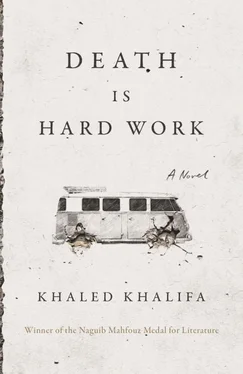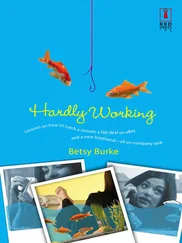Bolbol did his best to avoid hearing such stories, but some still managed to reach him. Somehow his ordinary, enormous baseline level of fear had managed to worsen since his father came to stay. He believed that the walls containing his usual fear—like a musty, battle-scarred citadel—had finally been knocked down, and he was falling into open space. He couldn’t keep it up forever; living in this neighborhood made him pay for his life twice over. He was deeply lonely, and at the same time didn’t want to belong to any community. He was far from neutral in his mind: for example, he couldn’t stop himself from feeling cheered whenever he saw a funeral procession for the regime’s casualties pass by. He couldn’t meet their eyes in the posters hung on city walls declaring them to be martyrs. But fear prevented him from even gossiping with his coworkers when they gloated over the growing worries of the regime’s supporters, who were also beginning be afraid. Fear had become the only true opposition; it was now each individual versus their own fear, and no one trusted the regime any longer. The ongoing impasse was too terrible to be endured, and everyone had begun to speak of their fear openly. Anyone who had been confident of victory a year before began to feel powerless and weak, increasingly vulnerable, even in mortal peril. Since he was incapable of close observation of anyone else, Bolbol kept an eye on himself, only to discover that he was the most craven of all.
In the final months of 2013, the city had begun to feel a new pressure that no one could explain. In rare moments of clarity, Bolbol would say to himself that it was due to the idea of revenge, pure and simple, taking alarming root in the regime; it no longer wanted to win so much as to punish. He mused sardonically on this dreadful idea: he would wake up one day and see his street empty, everyone having run for their lives. The district chief had already fled, having spared no effort in surveilling every inhabitant of the neighborhood during his tenure. He wrote reports on all the suspicious characters there, including his own relatives, as had the young men who weren’t content with supporting the regime but carried weapons and insulted their childhood friends and generally made everyone’s life hell. Suspicions alone were enough to lead to corpses lining the streets. Suspicions alone were enough to cause someone to disappear without a trace.
Bolbol didn’t ask many questions, frightened of getting tangled in the same net of hatred and turning into yet another person bent on revenge. He would find a means of getting rid of his fear, he told himself, but it was difficult to get rid of the thought of revenge. It wasn’t even enough for your enemy to be dead for the fire of vengeance to be extinguished; you had to be the one to murder him yourself if your bloodlust was ever to be satisfied. It was terrifying to see such sentiments no longer hidden but plainly written on silent faces expressing nothing but wrath.
His father regretted leaving the land of the martyrs, as he proudly called his village. He wanted to sit quietly that night, but he was afraid of dying with Bolbol’s defeatist talk being the last words he heard from his weak, used-up son. He got up, went to the kitchen, and began to peel some potatoes; despite being clearly exhausted he was resolved to fry some the way Nevine made them. He cheered himself up by returning once again to her story, caring little that Bolbol found it painful to think of her as his father’s second wife and sweetheart, not Auntie Nevine, the wife of his father’s old friend. Afterward, Bolbol had the ridiculous idea of avenging his mother somehow… and then he fantasized about doing the same thing with Lamia if Zuhayr died: this time he would kneel at her feet and beg to be allowed to remain at her side. He used to think that love meant a happy old age with your beloved—as if the years before that were worth nothing, merely something to be gotten through in order for the lover to reach the moment when his torment would stop, a new life would begin, and the daydreams he had enjoyed hundreds of times in his warm bed would be reconstructed in reality. Happy were those who spent their old age with their lover. Old age was a deliberate reliving of childhood, and the time that separated these stages was just a distraction, however long it lasted, even if this meant years had to be willfully squandered before you could begin to understand their superfluity. This is what happened to his father when he met Nevine again. As for her, she didn’t need much time to think over his proposal. Mainly she was surprised by his folly. She’d thought that things between them had died, or else grown so obsolete that they could no longer mean anything to anyone. A few indirect comments weren’t a declaration of love under any circumstances—just as some shy and occasional glances were hardly a confession of desire.
She was astonished that Abdel Latif could still describe the first time she entered the school. He remembered the color of her socks, the style of her shoes, her white blouse and black skirt. He was eloquent in describing her perfume, the shape of her neck, her laughter, and the color of her eyes. He only left off describing each detail in order to return to it a moment later, this time more vehemently. Nevine was bewildered. She didn’t mask her longing for the days when S was still a small village crossed by one long, straight road, when it was surrounded by groves of olives, peaches, and apricots and grapevines. Its houses were spacious and welcoming then, the doors were always left open, and you could count the number of strangers on one hand. It was only a few kilometers from Damascus, but the road to the city used to be lined with meadows, of which only a few remained now.
She liked to have someone from those times around to reminisce with. In truth, she’d barely paid any attention to those attractions back when they’d really existed, but now she liked to give them central, undisputed pride of place in her memories. She’d had another life in art school that no one from S knew about, but in the end, it hadn’t been enough for her. That life consisted of a single failed love story, adolescent in its simplicity. She had been in love with the same young man as all the girls in her university class. She was the first to withdraw from the race, unable to bear being so totally ignored. Withdrawal suited her conservative personality and her lack of self-confidence, frightened as she was of the passions and caprices of the city. She guarded this story closely, considering it a dangerous secret, a failed sexual adventure, a one-time-only experience. Her reticence went unappreciated by her colleagues at the art college, where disorder and stupidity were an integral part of student life.
She thought of the long night when she met Abdel Latif again. They were both caring for a young man who had been hit by a sniper bullet, which had ripped through his shoulder. His prognosis was good, and there was no real cause for concern. The battle had stopped for some days, but the truce wouldn’t last. Everyone could see the hordes of regime forces at the entrances to the town; tanks and defense artillery had been stationed there, checkpoints made of sandbags had sprung up, and snipers had proliferated on every tall building that overlooked the town. That night there was a full moon, and everything was quiet. Abdel Latif had spent days rearranging every detail in the field hospital. He made a list of all the medications in the stores as well as the names of the patients who had been discharged, along with the casualties whose burials he organized meticulously in the new graveyard he’d built, with numbered graves. When preparing this new cemetery for the victims of the siege, he made sure to gather flowers for them all—something that caused Nevine to reflect that this man must have changed considerably since she’d last seen him. He seemed different from the other men his age: younger, more vigorous. Nothing frightened him anymore. He would rush into the heat of battle alongside the young men and drag the wounded to safety, heedless of dying himself. A strange energy welled up from inside him, and despite his long workdays he made do with only a few hours of sleep a night and never forgot a single detail required by the field hospital or the graveyard.
Читать дальше












